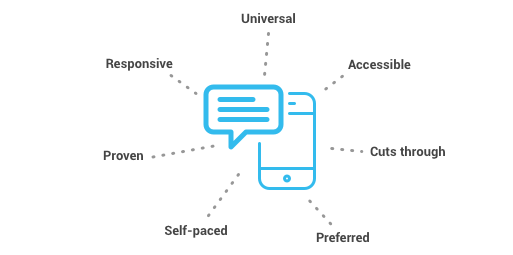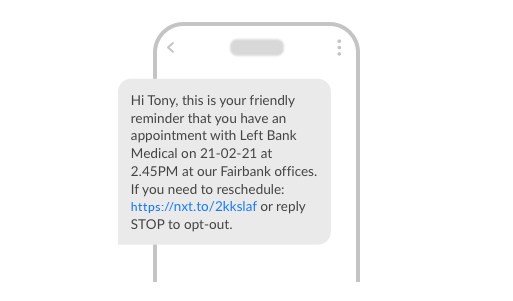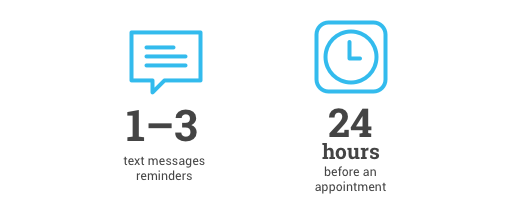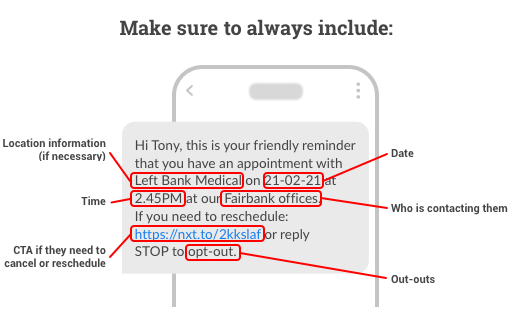Share article:
How to reduce no shows with text reminders for patients

Patient no-shows can cause significant distress and challenges for practices, physicians, and medical administrators. One Queensland hospital reported losing $4M per month to patients not showing up for appointments.
Solving low attendance rates and patient communications doesn’t require an onerous solution. In fact, sending simple and affordable text message appointment reminders might just be your answer!
RELATED: Find out how to calculate your no-show rate and how much it is costing your business!

Why you should use text reminders in medical practices
When you engage with patients, you are talking to everyone and anyone.
If health practitioners wish to communicate with patients and ensure attendance rates, they should pick communication technologies that are accessible and convenient. Using smartphone-only enabled apps isn’t going to work.
mHealth (aka mobile health) technology is defined by the World Health Organisation as the use of mobile and wireless technologies to help practitioners and medical offices achieve health objectives for their patients. With the rise in global phone coverage and increasing use of mobiles globally, mobile-assisted technology—especially SMS text messaging—seems best placed to reach as many patients as possible.
SMS technology is also:

- Ubiquitous – familiar and universal to most people
- Accessible – 5.25B people own or use a mobile phone
- Cut-through – 98% open rate versus email’s 20% open rate
- Preferred – 73% of consumers prefer to get a text message over other comms
- Self-paced – If responses are required from either end, practitioners or patients can respond at their leisure
- Proven – Consistent studies have shown that appointment text reminders can reduce no-shows by 50% across the board, not just for healthcare.
- Responsive – SMS can produce high response rates of +50%
SUCCESS STORY: When email was failing to produce quick and responsive communications, not-for-profit Rona Scrubs switched to text messaging to communicate with doctors and nurses instead. This produced 50% response rates within just 10-15 minutes—as opposed to 10% response rates for email—over a 2-week period.

Over the years, extensive research has demonstrated the power and effectiveness of patient appointment reminders for medical appointments. This is most likely why you’ve seen the widespread adoption of this communication channel by many healthcare providers!
162 research studies were undertaken in SMS appointment reminder behavior interventions, it was found that nearly all demonstrated that text message reminders improved patients’ medical compliance and they were significantly more likely to show up at their appointment on time – delivering better outcomes for both the patients and the medical facility.
4 tips for effective patient reminder text messages
If you’re considering using text messaging to help your practice reduce no-shows and increase engagement with patients, ensure you optimize your SMS appointment reminders with these four easy tips!
Save time by sending automated appointment reminders
Save your admin team some time and boost your bottom line by automating SMS reminders through your medical practice management software.
Make scheduling appointments easy with automated text confirmations and reminders that go out as soon as someone makes a booking. This process should also allow you to offer customers a preference for their communications, whether that’s via SMS or email.
Automate responses as well to allow for rescheduling or cancellations by adding two-way messaging to your text messaging sends. For example, the recipient could reply with Y to confirm, or an N to cancel. If they reply N, you could automate a follow-up message with a link or invite them to call in to reschedule.
Adding automated responses makes it even more convenient and easy for customers to engage with you.
RELATED: Learn about the new and exciting ways healthcare providers are using text messaging to deeper engage patients and provide better patient care.
Send the right number of SMS messages at the right time
The optimal number of appointment reminder messages varies between 1 – 3 depending on lead time (time until the appointment). When sending text messages you should aim to space them out. For example, bombarding a patient with 3 text messages if they’ve made a booking in two days’ time is excessive.

Make sure to always send one 24 hours before an appointment, while you can choose to space the other two as you see fit. For example, you might choose to send a final reminder 1-2 hours before the appointment. You could also send another 1 week before the client’s appointment.
Keep your SMS content brief and factual
One of the biggest reasons why SMS cuts through and incentivises actions is its brevity! With only 160 characters, businesses might get right down to the point or link to a web page for more information.
With patient text reminders, you want to keep to the facts (like appointment date) and stay concise. This helps customers to quickly skim, reply, and move on with their lives while still keeping the fact they have an upcoming appointment at the front of their mind.

Make sure to always include:
- Date and time
- Location information (if necessary)
- Who is contacting them
- CTA if they need to cancel or reschedule
- Opt-outs
Make your SMS messages personal
Did you know 71% of customers feel frustrated when an experience, whether medical, retail or otherwise, is impersonal?
Patients are often in vulnerable situations when they visit a physician. It’s essential therefore that communications are personalized so that patients feel you take their care seriously.
It’s also a lot easier than you think!
With text messaging, you can easily add in parameters such as #FIRST NAME# or #DOCTOR#. Your healthcare management system or our web portal should be able to pick up the information from your patient database and add it directly into the communications you send to patients.

Final thoughts, further reading
Ensuring patient attendance doesn’t have to be a headache. With text message reminders, you can easily uplift attendance by up to 50%. If you want to learn more or speak to someone about your no-show challenges; make sure to please call or contact one of our messaging specialists now.
Make sure to also check out:
- The many different ways text messaging in healthcare helps improve patient outcomes (not just appointment reminders)
- 6 essential best practice tips for appointment reminder texts
- How COVID-19 has changed the way healthcare providers communicate
- Download our free reduce no-shows with business messaging ebook
